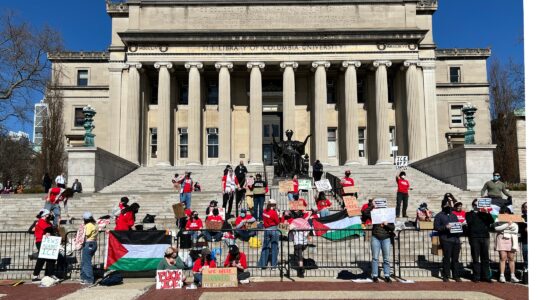While one may trace the recent outbreak of Israel-Hamas warfare to the abduction of three Israeli teenagers in June or to the Israeli invasion of Gaza in July, it is a futile and impossible task to assign a specific date of origin to the Israeli-Palestinian conflict. Both groups are enmeshed in each other's past, present and future and armed aggression seems to be their predominant form of interaction.
Coexistence is an eternal struggle amidst structural and economic devastation in Gaza and the constant fear of death in Israel. The conflict has catapulted to a problem of international proportions and while the idealistic outcome of this problem is a lasting peace, it is not a simple goal to achieve.
Peace is the outcome of a successful solution and the necessary elements to achieve this peace must be closely examined. In ordinary diplomacy, a truce comprising elements from both parties' demands would be enacted. In this case, since one of the parties is a terrorist organization, ordinary diplomacy would lead down a path to the continuation of warfare. The only way to create lasting peace with a group that violates ceasefires is through enforcement: the international community must guarantee immediate intervention if Hamas violates the terms of a treaty.
Although the first shots of the most recent outbreak were fired more than a month ago, this is not a new war. Only the names, the demands and the weapons have changed. Closing our eyes to past diplomatic failures renders the entire region liable to the recurring cycle of violence. Too many times we have fallen prisoner to the tempting ends of an immediate, yet temporary, peace without considering the tools to make it lasting. Too many times we failed to address the issues that led to combat in the first place.
Hamas, the terrorist organization that took political control of the Gaza Strip in a 2006 election, is the aggressor. They hide weaponry and explosives in the homes of innocent civilians, in schools filled with people seeking shelter and in houses of worship. They use their own people as human shields to defend against retaliations from their attacks. They built tunnels under the property of their own citizens to smuggle weapons. They view their people as pawns to be used like interchangeable parts in their grand scheme of destruction. “[This is] the generation of the missile, the tunnel and suicide operations,” said Hamas leader Ismail Haniyeh at a youth paramilitary camp, according to The Times of Israel.
For years Israel has suffered through rocket fire and the slaughter of innocent citizens by terrorist groups such as Hamas. Even after the start of this summer’s ground operation, the Jewish state looked to preserve as many lives as possible by forewarning citizens of incoming attacks. “We are using missile defense to protect our civilians, and they’re using their civilians to protect their missiles,” said Israel’s Prime Minister Benjamin Netanyahu in a June interview on Fox News Sunday.
There is only so much pain and suffering a nation can endure before retaliating. While it is impossible to justify the killing of innocent people, it must be understood that the guilty party in this case is not the one firing the bullets. Hamas must be held accountable for the deaths of their citizens. By using civilians to guard their arsenals, Hamas gives the Israeli soldiers no choice and turns a mission of national defense into one of destruction. Hamas must be held accountable for the warfare, as they are the ones who fired the rockets and used provocation as a tool to garner international sympathy. It is Hamas who bears accountability for every drop of blood.
“We will do whatever is necessary to achieve our goal of a sustained quiet,” Netanyahu said in a July interview on CNN. Achieving a lasting peace is the shared goal of Israel, the United States and peacemakers such the United Nations. Hamas does not share this vision. The civilian deaths caused by Israeli weapons come with great reluctance as Israel pursues peace before being forced into armed retaliation. The deaths caused by Hamas weapons come without purpose or sorrow; they come merely with the desire to kill. Their new long range missiles allow them access to more than 75 percent of Israel’s population, according to charts on the website of the Israel Defense Forces.
Hamas lobs rockets into Israel with the intent to slaughter people as if they were hunting wild animals. While a wild animal has every right to defend itself against hunters or predators, Israel is criticized for its self-defense. The country faces international pressure to stop this defense. In the face of loud provocation, the international community is asking Israel for silence.
While Israel is justified in its invasion of the Gaza Strip, the necessity of future military action could be eradicated with intervention and support from inter-governmental organizations. The United Nations “employs the political tools of diplomacy and mediation to help nations prevent and…avert the suffering and destruction of war,” according to the U.N. political affairs department. The United Nations should pressure Hamas to comply with demands for eradication of their weaponry and provide financial support for Israel’s defense. Economic and public support of Israel by other nations would hasten the peacemaking process and bring a rapid end to the widespread suffering.
As the conflict rages on and death tolls increase, it is tempting to accept a temporary peace, that temporary quiet. It must be understood that acquiescence will lead to further conflict. Hamas may bask in the sympathy of the international community and demand a humanitarian ceasefire, but it is just to restock their arsenal and, as history indicates, violate any agreed-upon truce.
Though ruins are abundant and the dust is far from settled, the truth is crystal clear: Israel must receive unconditional support from the international community in its quest for a sustained quiet.
The New York Jewish Week brings you the stories behind the headlines, keeping you connected to Jewish life in New York. Help sustain the reporting you trust by donating today.




